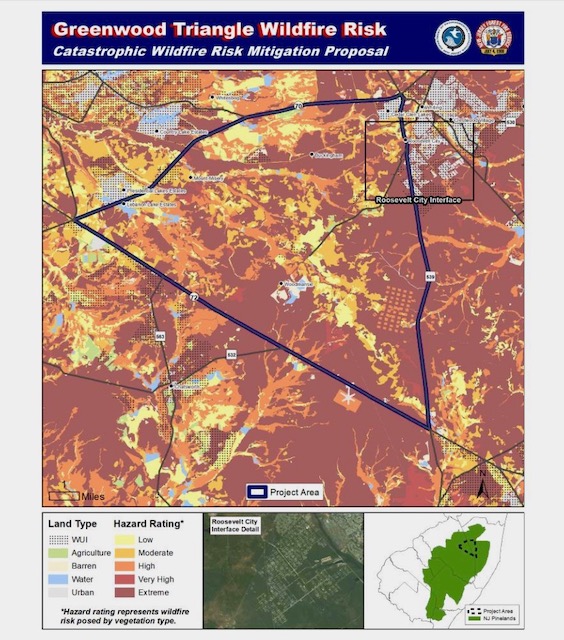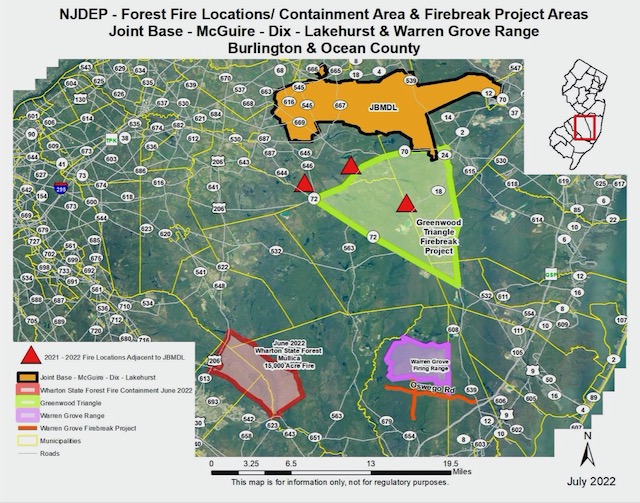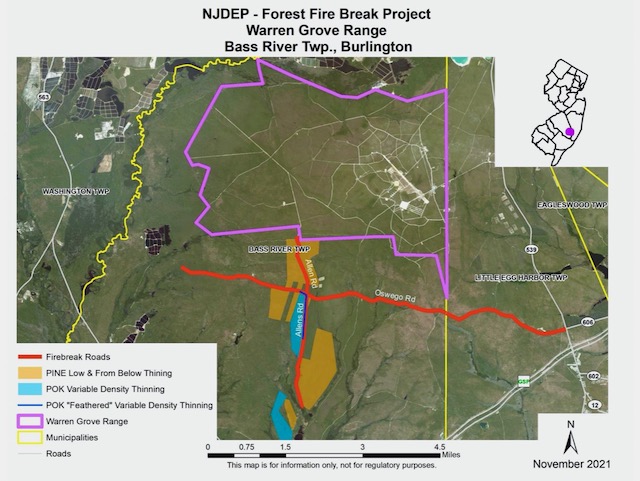DEP Pinelands Forestry Plan Was Based On A Mountain Of Lies
Part Two: Oh What A Tangled Web We Weave
Crocodile Tears For DEP Logging of 21 Acres – But Praise For DEP Cutting 1,400 Acres
Was DEP only “cutting unhealthy, suppressed, and poorly formed trees” ???
DEP Was Destroying an “Exemplary stand of globally imperiled natural community”
This is part two of the series to expose the lies used to justify the military funded NJ DEP’s Pinelands Forestry Plan.
Part One provided an introduction and overview of the troubling information revealed in government documents, with select DEP maps that illustrate some of the deceptions. Along those lines, it is interesting to compare the map above that DEP provided to the Pinelands Commission with the same map DEP previously provided to the military in the REPI grant. Entirely different titles, dates, mapped features, and project purposes and justifications – for the same project.
Today, we highlight the critical natural resources that are impacted by the DEP 1,400 acre logging plan and were conveniently ignored or lied about by DEP and the conservation groups NJCF and PPA, who both aggressively supported and promoted the DEP plan.
In a recent NJ Spotlight story “Anger grows after NJ cuts down swath of forest”, those same conservation groups blasted the DEP for logging just 21 acres of forest and destroying critical habitat:
“It is not forestry; it’s land clearing,’’ said Emil DeVito, manager of science and conservation at the New Jersey Conservation Foundation. “This is a pristine intact core forest. We are supposed to be protecting those places.’’ The upland forest provided habitat for barred owl and red-shouldered hawk.
NJCF and PPA objected to the lack of public awareness and ability to comment:
The Division of Fish and Wildlife in the Department of Environmental Protection took the action last month in the Glassboro Wildlife Management Area with virtually no public notice and input, conservationists said.
And PPA was angry about DEP’s failure to consider impacts of logging on plants:
The clearing demonstrates that plants do not matter when the fish and wildlife division is dealing with wildlife issues, according to Jaclyn Rhoads, assistant director of the Pinelands Preservation Alliance.
Well, again I call bullshit on that (see my initial prior post).
Why this over the top “angry” response, when both NJCF and PPA supported DEP logging in Pinelands forests that would destroy 1,400 acres of environmentally sensitive forests, with critical habitat values and rare plants and animals that far exceed the 21 acre parcel in Glassboro WMA they were allegedly so angry about.
And – just like DEP – both NJCF and PPA lied to the public about that Pinelands logging project. Here are just a few more examples of how.
1) Lack of Public Awareness and Involvement
Let’s begin with the lack of public awareness and opportunity to comment that NJCF and PPA object to in the DEP’s Glassboro WMA 21 acre logging project (which is located OUTSIDE the Pinelands and provided even LESS STRINGENT regulatory protections – none.)
For the DEP’s massive 1,400 acre logging project located INSIDE the Pinelands, the Pinelands Commission allowed DEP to provide JUST 10 days for public comment. The DEP public notice was an obscure legal notice in the Press Of Atlantic City. As a result, there was no public comment on the DEP’s 1,400 acre logging plan. I testified to the Pinelands Commission AFTER they had already approved it on October 14, 2022.
Both NJCF and PPA knew all about this DEP logging plan for many months but – just like DEP – they both kept that information secret.
In fact, NJCF and NJ Audubon own property within 200 feet of the DEP logging project and were provided formal legal notice. That adjacent land ownership adds another level of conflict of interest in their ethical abuses.
2) Lies About Ecological Values
Here is how the DEP described those Pinelands forests in the August 18, 2022 legal public notice on their Pinelands Commission application: (on page 27):
“Operations will involve cutting unhealthy, suppressed, and poorly formed trees, while favoring the retention of healthy species of oak and pine, utilizing the appropriate mechanized equipment”.
Emile DeVito of NJCF virtually echoed those same DEP false comments: (NJ Spotlight, 12/13/22)
“Most of the thinning happens with a mower – its not a lawn mower its a forestry mower. But they’re not really removing any large trees. Most of them are only a few inches in diameter. They’re all short and bent over, those are the things being removed, for the most part. They’ll resprout anyway.”
But in sharp contrast to those lies, here is how the DEP’s Natural Heritage Program described the forests, habitat, and natural resources (attachments to August 18, 2022 letter to DEP Forest Fire Service), which documented numerous rare plant species and ecological communities; rare wildlife species and habitat; vernal pool habitat; and two Natural Heritage Priority Sites:
A large patch of pitch pine shrub oak barrens and pine plants in broad sandy uplands…
An extensive dwarf pitch pine/scrub oak forest. …
Exemplary stand of globally imperiled natural community. Also a number of globally rare plants and animals are present.
This microsite contains a globally imperiled natural community and a number of globally rare plants and animals.
So is this forest “unhealthy, suppressed, and poorly formed trees” (DEP) and “all short and bent over” (Emile DeVito, NJCF)?
Or is it an “Exemplary stand of globally imperiled natural community. Also a number of globally rare plants and animals are present.” (DEP Natural Heritage Program).
In the 21 acre DEP logging at the Glassboro WMA, Emile DeVito (NJCF) was particularly concerned about “barred owl and red-shouldered hawk.”
But the adversely impacted incredibly rich and diverse habitat and rare plant and animal species in the 1,400 acre Pinelands logging he supported identified by the DEP Natural Heritage program include:
1) carpenter frog; 2) pine barrens tree frog; 3) bald eagle; 4) barred owl; 5) black-billed cuckoo; 6) brown thrasher; 7) common nighthawk; 8) northern parula; 9) red shouldered hawk; 10) snowy egret; 11) whip-poor-will; 12) wood thrush; 13) bobcat; 14) eastern box turtle; 15) northern pine snake; 16) timber rattlesnake; 17) seven species of rare vascular plants; 18) one species rare non-vascular plant; 19) three rare terrestrial communities; 20) two Natural heritage Priority sites; and 21) many more adversely impacts rare species and habitat within the immediate vicinity.
Why didn’t NJCF or PPA raise any concerns about DEP destroying 1,400 acres of this rich forest habitat?
(Sorry, no links – but I am glad to provide the all the data tables from DEP NHS letter, none of which PPA or NJCF mention in defending and promoting the DEP logging plan).





